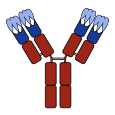|
Outline of immunology
The following outline is provided as an overview of and topical guide to immunology: Immunology – study of all aspects of the immune system in all organisms.[1] It deals with the physiological functioning of the immune system in states of both health and disease; malfunctions of the immune system in immunological disorders (autoimmune diseases, hypersensitivities, immune deficiency, transplant rejection); the physical, chemical and physiological characteristics of the components of the immune system in vitro, in situ, and in vivo. Essence of immunology
1. General Immunology 2. Basic Immunology 3. Advanced Immunology 4. Medical Immunology 5. Pharmaceutical Immunology 9. Clinical Immunology 6. Environmental Immunology 8. Cellular and Molecular Immunology 9. Food and Agricultural Immunology
History of immunologyGeneral immunological concepts
Components of the immune systemAdaptive immune system
Innate immune system
Organs of the immune systemPrimary lymphoid organs
Secondary lymphoid organsCells of the immune systemMyeloid cells
Lymphoid cells
Others
Hematopoiesis
Molecules of the immune systemImmune receptorsAntigen receptors
Pattern recognition receptors (PRRs)
Complement receptors
Fc receptors
Cytokine receptors
Natural killer cell receptors
OthersAntibodies
Cytokines
MHCsMajor histocompatibility complex Complement proteins
Antimicrobial peptidesTranscription factors
Signaling pathwaysCell adhesion molecules (CAMs)
Others
Immune system disordersHypersensitivity and Allergy
ImmunodeficiencyCancers of the immune systemMyeloid diseasesInflammatory diseasesImmunoproliferative immunoglobulin disordersImmunoproliferative immunoglobulin disorders Lymphatic organ diseaseImmunologic techniques and tests
Immunology and healthImmunologistsImmunology lists
References
External links
|
